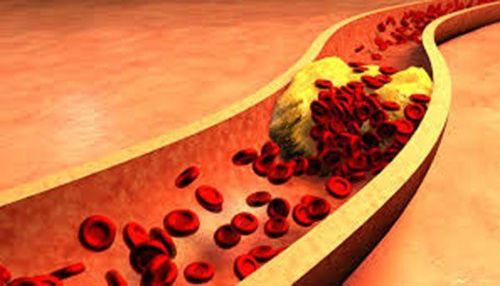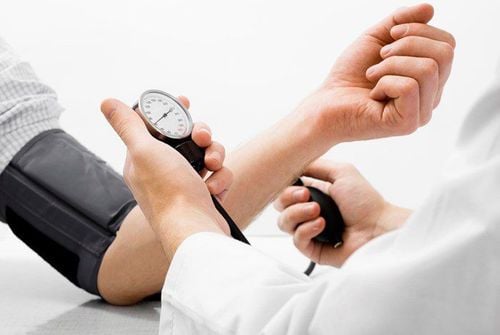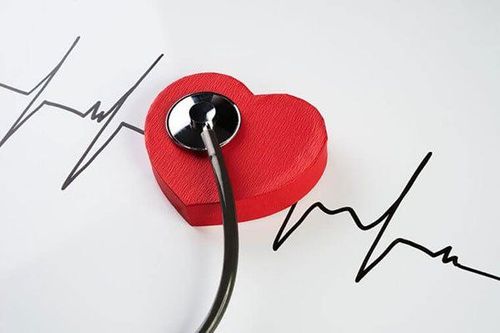This is an automatically translated article.
The article was written by BS.CKII. Luong Vo Quang Dang - Head of Department of Medical Examination & Internal Medicine - Vinmec Phu Quoc International General Hospital.Heart attack and stroke are serious cardiovascular events and are two of the causes of high rates of disability or death in modern life. The most common cause of heart disease or stroke is the process of forming atherosclerotic plaques in the blood vessels.
Modern medicine has identified the risk factors for cardiovascular disease or stroke as well as ways to prevent them. Many people with health concerns, including health care workers, often ask questions such as: Who is more susceptible to cardiovascular diseases? Who should be actively applying preventive measures, minimizing risk factors? The following article provides useful information on 10-year cardiovascular risk assessment through concise questions and answers.
1. Who should have their risk assessed for cardiovascular disease or stroke in the next 10 years?
All of us, who have not had cardiovascular diseases, are potential candidates for these cardiovascular diseases. But not everyone will develop heart disease. Risk assessment should begin in:
All persons 40 years of age or older, Adults of any age if there is a family history of early cardiovascular disease such as a father or brother with the disease heart attack or stroke before age 55, a mother or sister with cardiovascular disease before age 65. People with close relatives with familial hyperlipidemia. People with cardiovascular disease, diabetes do not need to have this risk assessment because they are already in the high-risk group.

2. Can I know my risk of cardiovascular disease in the next 10 years?
Entirely possible.
There are many methods of predicting cardiovascular and stroke risk in the next 10 years, but many medical professionals prefer the QRISK® spreadsheet with version 3 in 2018 because of its higher accuracy because it relies on many factors. more charges.
Reference link: https://qrisk.org/three/
You can refer to the example in question 10.
3. What is the 10-year cardiovascular risk calculation based on?
Besides recording anthropometric characteristics such as age, sex, race, health staff will help you identify risk factors from lifestyle such as:
Smoking or not, Overweight or obesity, Sedentary lifestyle Drinking a lot of alcohol At the same time, information about your health status should also be recorded, such as:
Systolic blood pressure Index Comorbidities: Atrial fibrillation, Lupus, Rheumatoid arthritis, Migraine headache, Chronic kidney disease, psychological and psychiatric disorders, Erectile dysfunction, taking corticosteroids. Laboratory indicators are also recorded, such as:
Blood cholesterol HDL-cholesterol (good fat index)

4. Why should I calculate my risk of cardiovascular disease in the next 10 years?
As mentioned above, we are all at risk for cardiovascular diseases, more or less. Proactively knowing your risk level will be the premise for the development of goals and strategies to reduce cardiovascular risk factors through drug treatment or lifestyle changes to minimize complications. may be later.
5. How are the results interpreted?
The 10-year cardiovascular disease risk results will be displayed as %.
Risk is low if < 10%. Risk is moderate if 10% - 20% Risk is high if ≥ 20%. For example, if your result is 30%, that means you have a 30% chance of developing cardiovascular disease in the next 10 years. In other words, 3 out of 10 people with risk factors like yours will develop cardiovascular disease in the next 10 years.
This result reflects the risk of disease in the large population, it cannot predict what will happen in a particular individual.
As another example, patient A has a 10% risk and patient B has a 25% risk. We can understand that patient B currently has more cardiovascular risk factors that need to be addressed and corrected more aggressively in the future.
6. What are the cardiovascular risk factors?
Smoking. Lazy physical activity Overweight, obesity Eating salty foods High blood pressure Diabetes Hypercholesterolemia Kidney disease.
7. Who needs treatment to improve cardiovascular risk?
Active treatment to reduce the risk of cardiovascular disease is recommended for patients at moderate to high risk. Including:
People with risk score >=10%. People with pre-existing cardiovascular disease: The goal is to slow disease progression, avoid making it worse. People with diabetes: Cardiovascular disease is always accompanied by diabetes and can be considered a complication of diabetes. Preventive treatment, minimizing risk factors should be implemented as soon as possible. People with chronic kidney disease: Often accompanied by disorders of blood pressure, blood fat, electrolytes, uric acid. All have negative effects on cardiovascular diseases.
8. What must I do to improve the results?
Nothing more than that you should adopt an active lifestyle with the following basic suggestions:
Stop smoking if you are currently smoking: If you quit smoking before the age of 35, your life expectancy is almost If you quit smoking before age 50, you will reduce your risk of dying from tobacco by 50%. Healthy eating includes snacking. Exercise for at least 30 minutes every day. Limit alcohol. Lose your ideal weight. Control blood cholesterol with Statins. Depending on the disease, the doctor will adjust the target cholesterol level differently. Take medications to lower blood pressure, or lower blood sugar if you have high blood pressure or blood sugar.

9. What should I do if I am in the low cardiovascular risk group?
Congratulations if you have a low cardiovascular risk result!
However, this does not mean that you are completely free of risk, or will never develop cardiovascular disease.
You probably won't need pharmacological risk-reducing interventions. What you can do better to stay in this “fit” is to continue to maintain an active lifestyle, as indicated in verse 8 (if true).
Routine annual physical examination and cardiovascular risk reassessment is recommended.
10. A concrete example of a 10-year cardiovascular risk assessment
Patient A, 45 years old male, whose biological father died of myocardial infarction at 58 years old. He has smoked 1 pack of cigarettes a day for the past 20 years and is being treated for high blood pressure regularly.
He has a BMI of 26.6 (overweight) and a blood pressure reading of 135/73 mmHg.
Blood test shows Cholesterol 5.1 mmol/L, HDL-C 1.02 mmol/L.
By calculation with the QRISK®3-2018 table, Patient A's risk of having a heart attack or stroke within the next 10 years is 18.6%.
Rationale: In a group of 100 people with the same risk level as Patient A, about 19 people will have a heart attack or stroke, respectively, within the next 10 years.
Compared to another person, Mr. B has the same age, race, and sex as Patient A but Mr. B has none of the above risk factors. Mr. B's risk of having a heart attack or stroke within the next 10 years is 2.5%. So, Mr. A's risk of cardiovascular disease is 7.6 times higher than that of Mr. B.
Compared to another person, Uncle C is a healthy person, without any of the above risk factors, but has a high risk of disease. Cardiovascular rate was equal to that of Patient A at 18.6%. Can you guess how old Uncle C is? Uncle C's age will be 72 years old. This concept is called the actual age of the heart. Patient A is 45 years old, but patient A's cardiovascular system is 72 years old.
11. Who will help me assess my 10-year cardiovascular risk and explain the results to me?
Currently, Vinmec Phu Quoc International General Hospital is providing basic and in-depth cardiovascular screening packages. This will answer your unknown cardiovascular risk in the next 10 years. With a thorough and dedicated examination and consultation of cardiologists on the results of in-depth cardiac tests and investigations, meeting international standards, we will help you identify yourself. where are standing on the way to prevent cardiovascular disease. To achieve the best prevention, with fewer side effects from medication if any, to minimize complications, and to live well with fewer heart disease concerns, no one else but you. , with the help of medical staff from Vinmec Phu Quoc.
Please dial HOTLINE for more information or register for an appointment HERE. Download MyVinmec app to make appointments faster and to manage your bookings easily.














